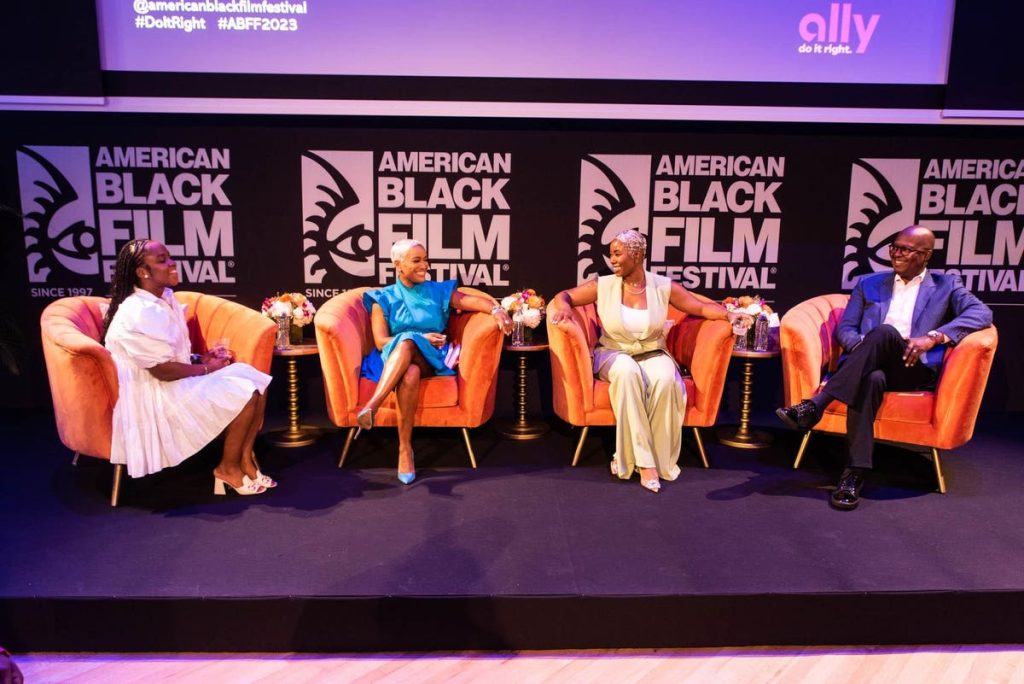Earlier this month, filmmakers, creatives, and storytellers flocked to Miami for the highly-anticipated annual American Black Film Festival (ABFF). The festival, founded in 1997 by Jeff and Nicole Friday, celebrates and affirms Black storytelling by way of cinema and television. This year’s annual event, from June 14-June 18, featured screenings for a multitude of projects, including The Color Purple, OWN’s Time of Essence, and more. The festivities kicked off with a warm welcome from its co-founders, along with Emmy-winning writer, producer, and actor Lena Waithe. Waithe, the 2023 ABFF ambassador, feels that such an honor is a way for her to shine a light on the work of underrepresented creatives.
“Being the ambassador means I get to continue to shed light on filmmakers and storytellers that, for some reason, people may not want to look at. It’s important for us to have stories, for us to feel seen, and for us to feel heard. When we don’t feel heard, and we don’t feel seen, it tells us something that’s not true, and it’s that we don’t matter, or our voices and stories don’t matter. I think if I can be a beacon of light at all, it’s just to remind us that we absolutely do matter and people want to hear our stories. Whether they look like us, love like us, or do not, our stories are important.”
While Waithe’s star power undoubtedly illuminated the launch of an impactful week, it was magnified thanks to the upcoming Netflix film They Cloned Tyrone. While the film officially debuts next month, attendees were treated to a screening of the highly-anticipated feature. Starring the immensely talented Jamie Foxx, John Boyega, and Teyonah Parris, the film also features an impressive lineup on the backend. Stephen “Dr.” Love, The Land producer, also lent his expertise to this film, producing it in partnership with Macro. As anticipation for the film continues to heat up, Love, the force behind Made With Love Media Group, makes it clear that the intentionality in bringing it to life is purposeful.
“It is definitely intentional in the idea that multiple genres are being mashed up together. Between sci-fi and comedy and mystery, it’s like how do we solve the mystery, but at the same time, add comedic elements to resonate with the Black community. For Black audiences, it feels like home, but that’s what’s dangerous about it because it feels like home, and we’re telling you that things about your home might not be all the way right, and that was the intention. When I first started breaking the film down with the director Juel Taylor and co-writer Tony Rettenmaier, Taylor wanted to explore the things that were just in his mind, related to conspiracy theorists in general. I feel like Black folks are the first people to really dig into sci-fi naturally because we have good reason to have concerns about how everything affects us. And it affects us first and the hardest, usually.”
As to be expected, the fun didn’t stop there. As creators had the opportunity to view other screenings and panel discussions throughout the festival, they also had the chance to learn about another important part of the filmmaking process — finances. Thanks to Ally Financial, this base was well covered in large part in their panel Creator Economy: From Bootstrapping To Business. The leading financial institution assembled an all-star lineup of panelists whose business acumen is just as successful as their creative pursuits. Moderated by award-winning entertainment journalist Gia Peppers, the panel consisted of Jack Howard, the senior director of financial health and wellness of Ally Financial, Ronne Brown, branding expert and founder of Girl CEO and studio executive and producer Michael Swanson.
Not only were guests able to learn about their respective creative journeys, but they also picked up on a few gems related to the importance of financial wellness. Howard feels that the same work ethic put into sustaining one’s creative career should also apply to understanding its economic aspect.
“The same work that you put into your career and your creative process, you have to put that same level of work into your money and understanding it,” Howard said to the audience. “Whether it’s getting your mindset together or understanding money, credit, and your budget, all of that requires time. It’ll require some time to get good at these things so that when you have opportunities, you’re prepared. It’s important to really have an understating of the rigor that is also required with money.”
Read the full article here










